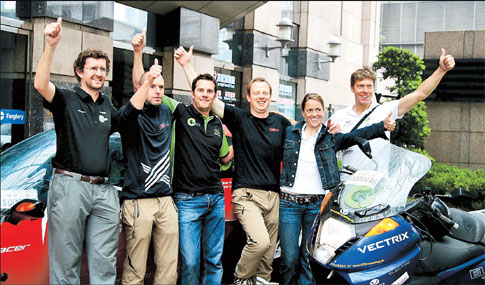Green drive goes global
|
|
|
Louis Palmer (left) and his teammates stop in downtown Shanghai after the team arrived in the city yesterday after traveling through 16 countries, including Germany, Austria, Russia and Kazakhstan. |
French novelist Jules Verne's dream to travel the world in 80 days is no big deal in today's world of fast transport. But adventurer Louis Palmer is taking a page out of Verne's book by attempting to travel the world in 80 days in emission-free vehicles.
Setting off in Geneva, Switzerland, on August 16, the 39-year-old Swiss and his team arrived in Shanghai yesterday.
Thus far, the journey has taken them 16,000 kilometers in 46 days with stops in 16 countries, including Germany, Austria, Russia and Kazakhstan.
Next stop: Vancouver, Canada.
"We want to show that electric mobility and renewable energies can provide a new solution for an ecologically balanced life on this planet," Palmer said. "This trip can let more people know that emission-free vehicles are possible and reliable. We drive for a greener future."
The "Zero Emission Race" team is made up of drivers from Switzerland, Germany and Australia.
He met these drivers in 2008, when he drove his solar-powered taxi during a 534-day global journey he called "Solar Taxi."
Palmer and his team have four emission-free vehicles for this trip - two scooters and two cars. They are either battery or solar powered.
The team can travel at an average speed of 80 to 120 kilometers per hour, depending on the roads. The batteries need to be recharged twice a day with each charge taking about four hours. The vehicles can run up to 550 kilometers a day.
Climate conference
Palmer and his team plan to visit 150 cities around the world and reach the World Climate Change Conference in Cancun, Mexico, at the end of November, where they hope to inspire world leaders. They plan on returning to Geneva on January 22, 2011.
"Of course there are many challenges and difficulties on our long way, as there are in this world," Palmer said. "But we will not give up."
Bad roads might be the biggest problem. "There is no better solution, just slow down," he said. A support van follows the team in case of accidents or emergencies.
In China, Palmer said they got lost in a rural area one night. They asked villagers for directions and made friends with some apple farmers.
The adventurer said the weird shape of the vehicles catches most people's attention. They often stop to take photos with curious onlookers and talk about the concept of emission-free vehicles.
Team member Julianna Priskin writes a journal and takes photos for the team every day.
Palmer is quick to note the entire trip will take more than 80 days.
"It is 80 days of car driving, not including the days of shipping," Palmer said. "It will take us another 60 days to ship all of our equipment across the oceans."
The team is going to stay in Shanghai for about two days to tour the Bund and "visit the Expo to see some pavilions of our countries," Palmer said.
The Zero Race is not intended as a one-time event. "We want to repeat it," Palmer said. "Maybe the next trip will be shorter with more emission-free cars taking part."
 0
0 







